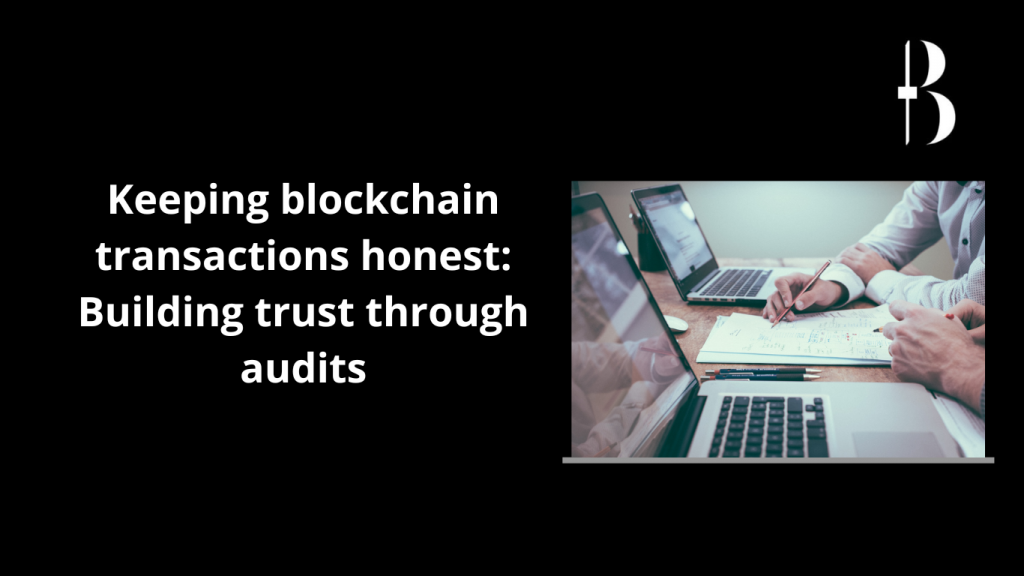For the integrity of blockchain networks to be guaranteed, trustworthy auditing mechanisms are essential.
Examining and confirming the information and transactions kept in a blockchain network is the process of blockchain auditing. To make sure it complies with the intended rules, protocols, and regulations, it focuses on evaluating the integrity and accuracy of the information stored on the blockchain.
Smart contract code is thoroughly inspected during the audit process to find vulnerabilities of all levels, from minor flaws to serious flaws that might potentially put millions of people at risk.
Auditors examine and point out centralization problems, confirm that the project code performs as the developer intended, and increase the efficiency of the code. They cover important topics such as logic problems, control flow, access control, and compiler faults. By doing this, the likelihood of a smart contract vulnerability is greatly decreased, offering an important safety net in the Web3 environment.
Auditing is not a cure-all, though. Due to time and financial restrictions, many projects frequently do not have their complete code audited, leaving unverified and potentially problematic areas of the code.
Additionally, as code is often modified or forked, a single audit is insufficient for long-term security. Audits must be ongoing.
In addition, it can be difficult to confirm that the code that has been deployed matches the code that has been audited. This highlights the importance of a more comprehensive approach to security that goes beyond simple code auditing, emphasizing the need for both transparency and traceability in the deployment process.
For a number of reasons, auditing blockchain systems is essential.
First and foremost, auditing guarantees the validity of the transactions that are logged on the blockchain. Examining the transaction history, validating inputs and outputs, and ensuring that the transactions adhere to predetermined rules and smart contracts are all necessary steps in this process. By doing this, auditing assists in preventing erroneous or fraudulent transactions and upholds the reliability of the blockchain network.
Second, blockchain auditing is essential for detecting fraud and maintaining security. The blockchain network’s transactions, access controls, and cryptographic processes are all carefully examined by auditors to spot any unauthorized or questionable activity. This factor is especially important in supply chains, financial systems, and sensitive data handling with significant potential dangers.
By making participants accountable for their actions within the blockchain network, auditing improves accountability. By making sure all stakeholders are responsible for their actions, it assists in identifying discrepancies or inconsistencies.
Auditing also fosters confidence and trust among stakeholders in blockchain-based systems. Organizations may make sure the blockchain network can manage rising transaction volumes and achieve desired performance goals by adjusting it based on audit findings.
The significance of trustworthy auditing procedures
Although auditors are crucial to the security of blockchain networks, entrepreneurs should only engage with trustworthy companies. Conflicts of interest are a problem with dodgy auditing firms. These organizations’ independence and neutrality may be jeopardized by undeclared conflicts.
They might have financial ties to the projects they audit or hold secret alliances or investments that skew their assessments. Conflicts like these cast doubt on the audit process’ objectivity and compromise its credibility.
For audits to assure responsibility and foster confidence, transparency is essential. However, opaque auditing firms frequently operate with little openness. Regarding their techniques, procedures, and the credentials of their auditors, they offer scant or ambiguous information.
According to a March 2023 Cointelegraph article, banks connected to the now-defunct cryptocurrency exchange FTX may have relied on false and inaccurate financial data from proof-of-reserve audits conducted by auditors working for the Public Company Accounting Oversight Board.
Paul Munter, the SEC’s acting top accountant, highlighted in a subsequent piece by Cointelegraph in December 2022 that investors shouldn’t put too much faith in a company’s proof-of-reserve audits. According to Munter, there is insufficient information in these proof-of-reserve papers for interested parties to establish whether the corporation has enough assets to cover its liabilities. Because of this lack of transparency, it is difficult to assess the accuracy and legitimacy of their conclusions, which raises questions about the reliability of their audits.
Audits should be performed by a third party; however, the findings are occasionally suspect because many auditors lack actual independence. In other words, they may have a motive to keep customers happy.
Another disadvantage of questionable auditing firms is insufficient due diligence. Effective audits call for in-depth investigation, which includes a thorough examination of the project documentation, source code, financial records, and security measures.
Some businesses might rely on incomplete or incorrect information from their audit efforts or do insufficient due diligence. As a result, they sometimes forget to mention important risks or vulnerabilities in their reports, which can be misleading or wrong.
Audits should be performed by a third party; however, the findings are occasionally suspect because many auditors lack actual independence. In other words, they may have a motive to keep customers happy.

